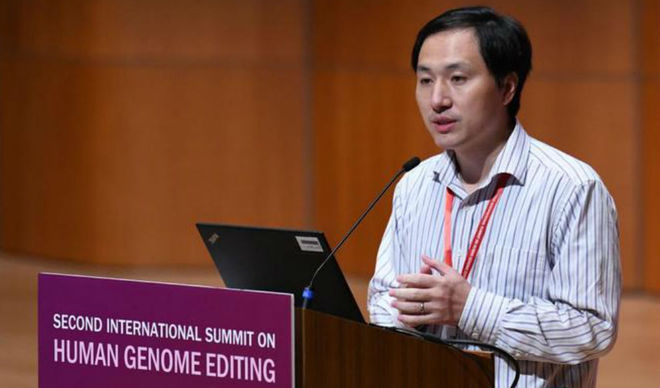
[ad_1]
(Biotica Observatory / UCVSeveral media have echoed the news: Chinese scientists produce genetically modified babies for the first time. According to He Jiankui, Chinese scientist responsible for this, his team managed to get the first genetically modified baby from its embryonic state. It's about two twins, Lulu and Nana, obtained through fertilization in vitro, whose genome was modified after fertilization with the CRISPR genetic editing tool. The goal was to make children resistant to AIDS, their father being the carrier of the virus that causes the disease.
Not yet contrasted
For now, this case has not been collected as a scientific article in any journal, but the Chinese geneticist made this announcement through a video on Youtube. However, critics of the scientific community have not been made, with many statements from scientists and bioethicists of great importance describing the facts of precipitous, irresponsible and unethical, at least .
Certainly, from an ethical point of view, but also scientific, the birth of these girls has an important impact, because it is the first time that the germinal genetic edition (in the gametes or the first embryos) gives place to the birth of human beings. It is worth mentioning here the difference between somatic gene editing and germinal gene editing. In the first case, the genome is modified in individuals who have already achieved some development, usually already born, although This can also be done in fetuses intratero. This will prevent genetic changes from being transmitted to offspring, or genetic aberrations that may truncate or seriously affect the development of the organism. Germinal genetic editing, meanwhile, implies that the changes made go from generation to generation and carry serious risks for safety, because the CRISPR action is not yet well controlled and our knowledge of the genome is limited. Similarly, this opens the door to the production of so-called "designer" babies, in which the modifications will not be made to cure a disease, but to obtain different improvements in the baby. Ethical implications this second possibility is therefore of enormous gravity. That's why Jiankui's experiments have been so criticized. In addition, the case of twins is framed in the field of improvement because they do not suffer from the disease, so that what has been done is not to cure them, but to provide them with of a preventive genetic trait, which poses additional disadvantages.
Finally, let us point out that the genetic publishing of human beings is produced for more than three years, since in April 2015 scientists, also Chinese, announced that they had modified the genome of & gén # gén gén gén gén gén gén gén gén gén gén gén gén gén gén gén gén gén 2015 gén 2015 2015 2015 2015 2015 2015 2015 2015 2015 2015 2015 2015 2015 2015 2015 2015 2015 2015 2015 2015 2015 2015 2015 2015 2015 2015 2015 2015 2015 2015 2015 2015 2015 2015 2015 2015 2015 2015 2015 2015 2015 2015 2015 2015 2015 2015 2015 2015 2015 2015 2015 2015 2015 39, non-viable human embryos. Although initially, these experiences have also they were widely questionedother countries have soon joined these surveys (like England or United States) and not only with the help of unsustainable embryos, but also healthy, perfectly viable embryos, which are intentionally destroyed a few days after the modification of its genome. Some are embryos left by fertilization treatments in vitrowhile others are expressly produced as research topics. Therefore, what happened in China was expected, as it is the next logical step, even if it is certainly precipitated from the medical point of view.
Biological evaluation of the Biotique Observatory of the Catholic University of Valencia
In our opinion, the use and destruction of human embryos in research is morally unacceptable (see biological state of the human embryoand anthropic status). It is doubtful that germinal gene editing could somehow be safe from relying on animal studies alone, but that does not justify the sacrifice of human lives for this purpose, all the more so because germline genetic modification does not meet the medical needs of patients. existing, but at the desire of parents to conceive children, at least, in perfect health. Although this desire is legitimate, the means are not justified by the end, but must be justified in themselves.
In conclusion, there is no evidence of security necessary to justify the development of these experiments. However, technical progress in this area should not be based on experiments on human embryos, but on animal models, although there is no guarantee that a sufficient degree of safety can be achieved in the future. On the other hand, besides the security problems, there is the problem of the distinction between therapy and improvement, opening the door to the production of babies design. Finally, it is a practice for the moment inevitably associated with fertilization in vitro.
The implementation of interventions on the embryonic human genome involving improvement, design or selection projects may be a further step in the development of trans and posthumanistic projects, which constitute, in our view, the greatest attack on the human person in this 21st century.
[ad_2]
Source link